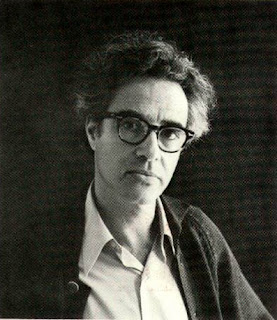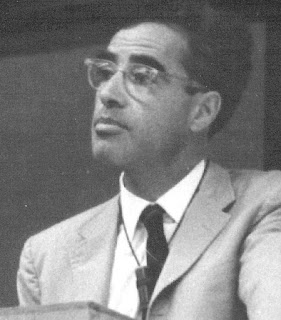Eric Lenneberg (1921 –1975) was a 20th century linguist, neurologist, and educator.
Profile
- Birth Name: Eric Heinz Lenneberg
- Date of Birth: September 19, 1921
- Place of Birth: Düsseldorf, Nordrhein-Westfalen, Germany
- Date of Death: May 31, 1975
- Place of Death: White Plains, Westchester, New York, USA
- Cause of Death: Unknown
- Interred at: Unknown
- Zodiac Sign: Virgo
- Nationality: NA
- Ethnicity: Jewish
- Father: NA
- Mother: NA
- Siblings: Helmut Lenneberg
- Spouse(s):
- Edith Maria Lenneberg née Salomon (1923-2005)
- Elizabeth Lenneberg née Smith(1933–2007)
- Daughter- Miriam Lenneberg
- Son- Roger Lenneberg
- Alma Mater: University of Chicago, Harvard University
- Eric Lenneberg is known for: pioneering the biological approach to the study of human language.
- Eric Lenneberg is criticized for: not being able to put forward substantial proof against his claim regarding start of lateralization.
- Eric Lenneberg was influenced by: NA
- Eric Lenneberg influenced: Noam Chomsky, Steven Pinker
- Awards: Guggenheim Fellowship for Social Sciences, US & Canada
Quotes
“The central nervous system and other tissues in the body develop simultaneously and influence one another continuously during morphogenesis.” ― Eric Lenneberg, Biological Foundations of Language (1967) p. 28
“Animals develop as an integrated whole including structure, function and behavioral capacities.” ― Eric Lenneberg, Biological Foundations of Language (1967) p. 240
“All animals have the ability to group together stimulus configurations which may be physically totally different from each other; however, the animal makes an identical response to certain ones and thus treats them as if they were similar in some respect; we cannot escape the conclusion that for the animal, some similarity exists among such stimuli.” ― Eric Lenneberg, Biological Foundations of Language (1967) p. 298
Major Works
- The language of experience (1956)
- New directions in the study of language (1964)
- Biological Foundations of Language (1967)
Did You Know?
- At the age of twelve Eric Lenneberg left Germany with his parents to live in Brazil.
- He came to the United States in 1945 and served in the Army for one year.
- Lenneberg married twice.
- He pioneered the notion that human capacity for language could be explained only on the basis of the biological properties of the brain and vocal tract.
- He received B.A. and M.A. degrees from the University of Chicago.
- Lenneberg obtained his Ph.D. from Harvard University in psychology and linguistics in 1956.
- He attended Harvard Medical School to study neuroscience.
- After earning his Ph.D. he held faculty posts at Harvard University.
- From 1964-1965 Lenneberg was a visiting professor of psychology at the University of Zurich.
- From 1967–1968 he was a professor of psychology at the University of Michigan.
- In the fall of 1968 became professor of psychology and neurobiology at Cornell University and Medical School.
- He was a visiting professor at the Universidade Federal de Pernambuco, Recife, Brazil.
- He was an invited lecturer at the Academia Nacional de Neurologia do Brasil.
- He conducted research at the Children’s Hospital Medical Center in Boston for locating children with extraordinary language disabilities or living in unusual circumstances to elaborate his theory of language development.
- With his wife, Elizabeth, he edited a book for UNESCO entitled Foundations of Language Development: A Multidisciplinary Approach.
- His experiments and views were encapsulated in his 1967 book, Biological Foundations of Language.
- His Biological Foundations of Language reflected his interest and expertise in both language and psychobiology.
- His ideas were subsequently adopted by Noam Chomsky and popularized by Steven Pinker in his book, The Language Instinct.
- Lenneberg died prematurely at the age of 53.
- Before his demise Lenneberg had been working at Cornell University as the professor of psychology and neurobiology.
- He died in White Plains, where he had been working on a, clinical research project in neuropsychology at the WestChester Division of New York hospital‐Cornell Medical Center.
Media Gallery




No comments:
Post a Comment